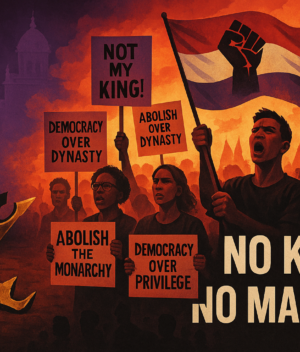The “No Kings” Protest: Latest Updates on the Growing Movement
The “No Kings” protest has emerged as a powerful anti-monarchy movement, gaining momentum across several countries where royal families still hold significant influence. What began as a decentralized online campaign has now spilled onto the streets, with demonstrators demanding the abolition of hereditary privilege, greater democratic accountability, and an end to taxpayer-funded monarchies.
Origins of the Movement
The “No Kings” movement draws inspiration from historical republican efforts but has been revitalized in recent years due to growing economic inequality, political scandals involving royal families, and debates over colonial reparations. Social media has played a crucial role, with hashtags like #AbolishTheMonarchy and #NoKings trending globally.
Recent Protests and Key Developments
1. United Kingdom: Republic Gains Traction
In the UK, the group Republic has intensified its campaigns following controversies surrounding King Charles III and Prince Andrew. Recent polls show a decline in support for the monarchy, particularly among younger generations.
-
June 2024 Protests: Thousands marched in London during the Trooping the Colour ceremony, chanting “Not my king!” and waving anti-monarchy signs.
-
Financial Transparency Demands: Activists are pushing for full disclosure of royal finances, including the Crown Estate’s profits and taxpayer-funded security.
2. Spain: Catalan Separatists Join Anti-Monarchy Rallies
In Spain, tensions between republicans and monarchists have flared again after King Felipe VI’s controversial speech on national unity.
-
Barcelona Protests: Pro-independence groups and left-wing activists rallied under the slogan “Fuera Reyes” (Out with Kings).
-
Public Opinion Shift: A recent survey found that 42% of Spaniards prefer a republic, the highest in decades.
3. Thailand: Rare Defiance Against the Monarchy
Thailand’s strict lèse-majesté laws have not completely silenced dissent. Underground republican networks continue to grow, especially among students.
-
Silent Protests: Activists use symbolic gestures, such as wearing white ribbons, to protest royal privileges without violating censorship laws.
-
Calls for Reform: While outright abolition remains unlikely, demands to reduce the monarchy’s political and military influence are increasing.
4. Netherlands & Scandinavia: Smaller but Growing Movements
Even in traditionally pro-monarchy nations like the Netherlands, Norway, and Sweden, debates over royal budgets and transparency are gaining attention.
-
Dutch Protests: Activists interrupted King Willem-Alexander’s public appearances, questioning the cost of the monarchy during a cost-of-living crisis.
-
Scandinavian Criticism: While support remains high, younger citizens are questioning whether hereditary rule aligns with modern democratic values.
Government Responses
Authorities in monarchist nations have responded with a mix of repression and concessions:
-
UK: Increased policing at royal events, with some arrests under public order laws.
-
Spain: Attempts to frame republicanism as a fringe movement, but opposition parties are pushing for a referendum.
-
Thailand: Heavy crackdowns, with activists facing long prison sentences.
What’s Next for the “No Kings” Movement?
The movement shows no signs of slowing down. Key factors to watch include:
-
Economic Pressures: As inflation rises, public tolerance for funding lavish royal lifestyles may decline.
-
Generational Shift: Younger, more progressive voters are less attached to monarchist traditions.
-
Global Solidarity: International coordination between anti-monarchy groups could amplify their impact.
While outright abolition remains a distant goal in many countries, the “No Kings” movement has succeeded in forcing a long-overdue debate about the role of monarchy in the 21st century.
What do you think? Should monarchies be abolished, or do they still serve a purpose? Let us know in the comments.






